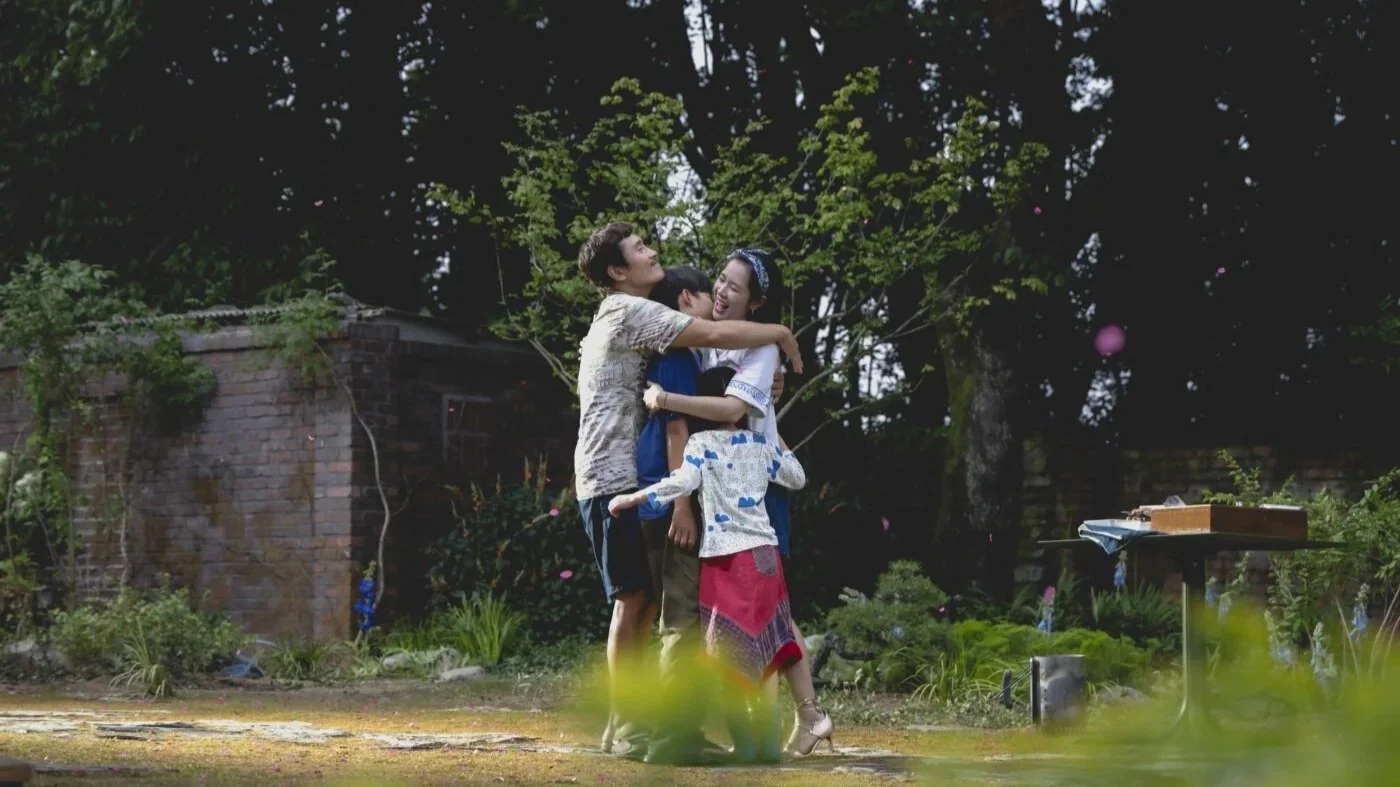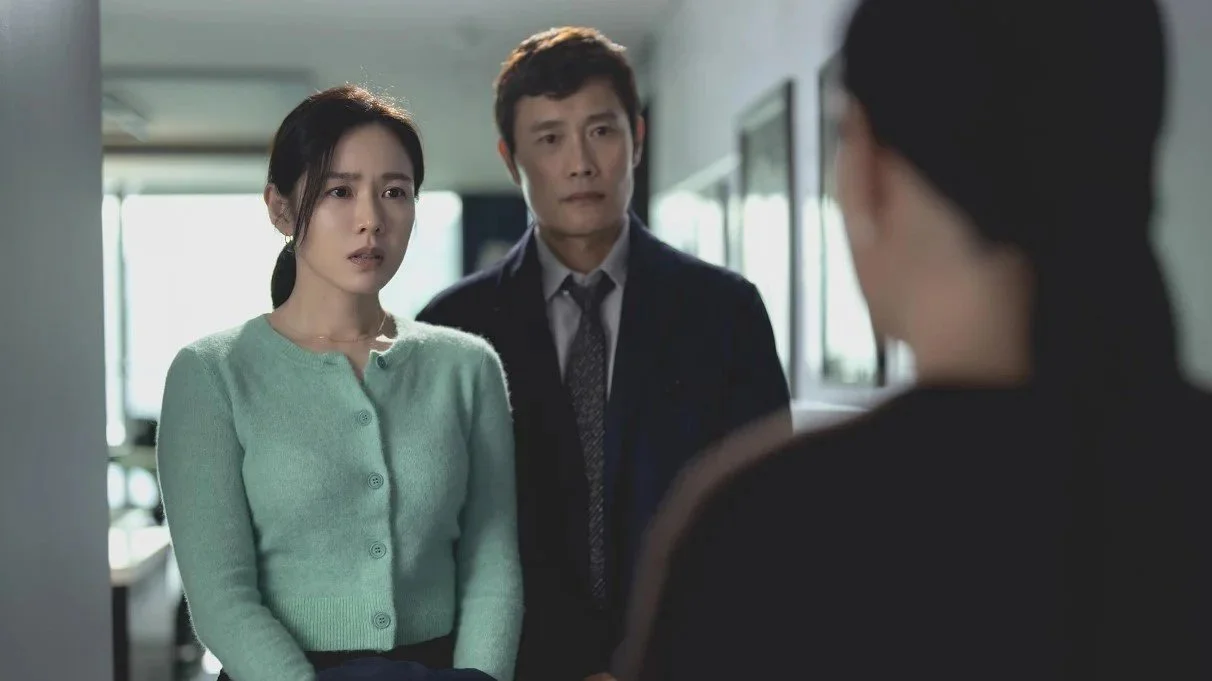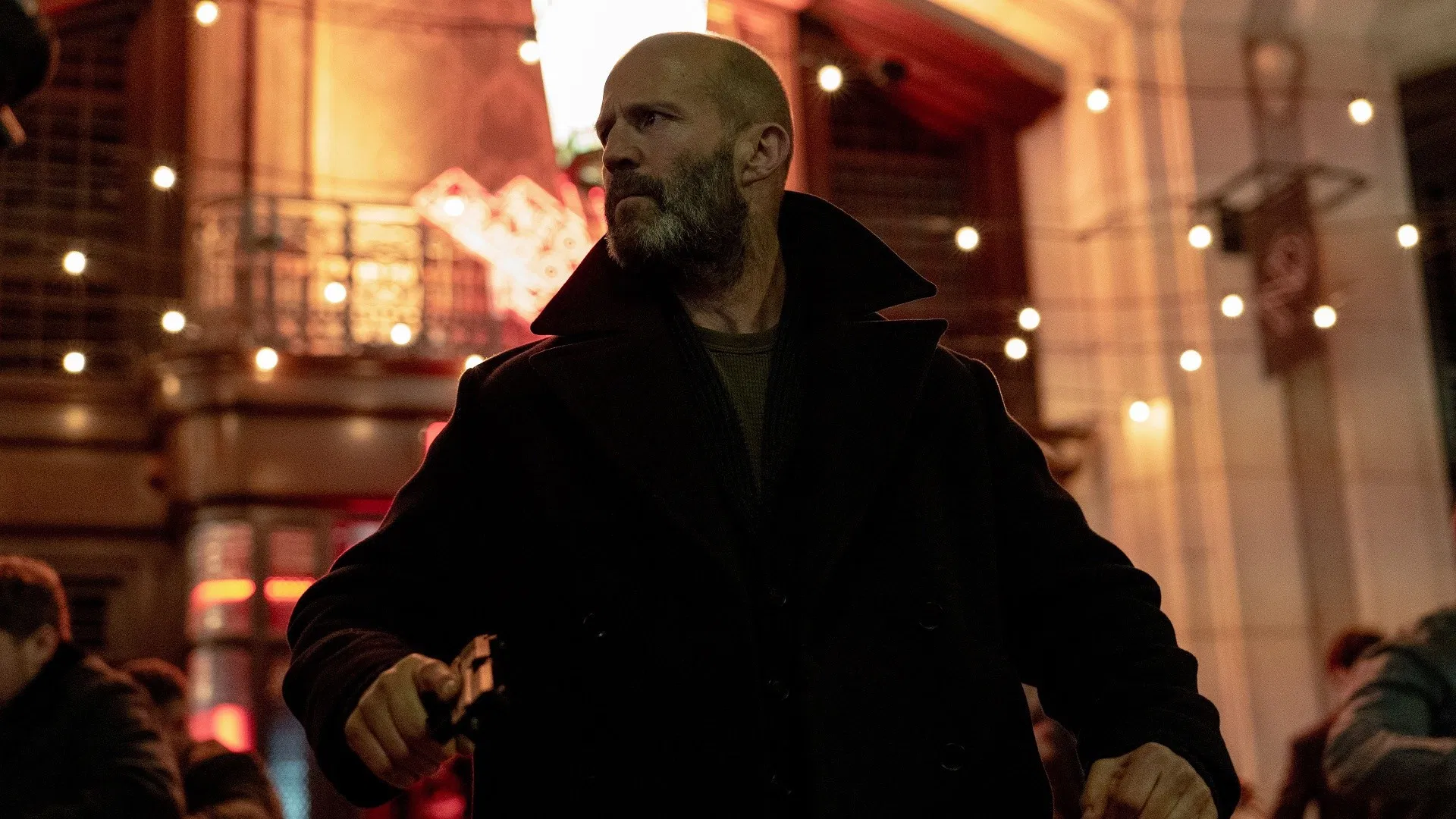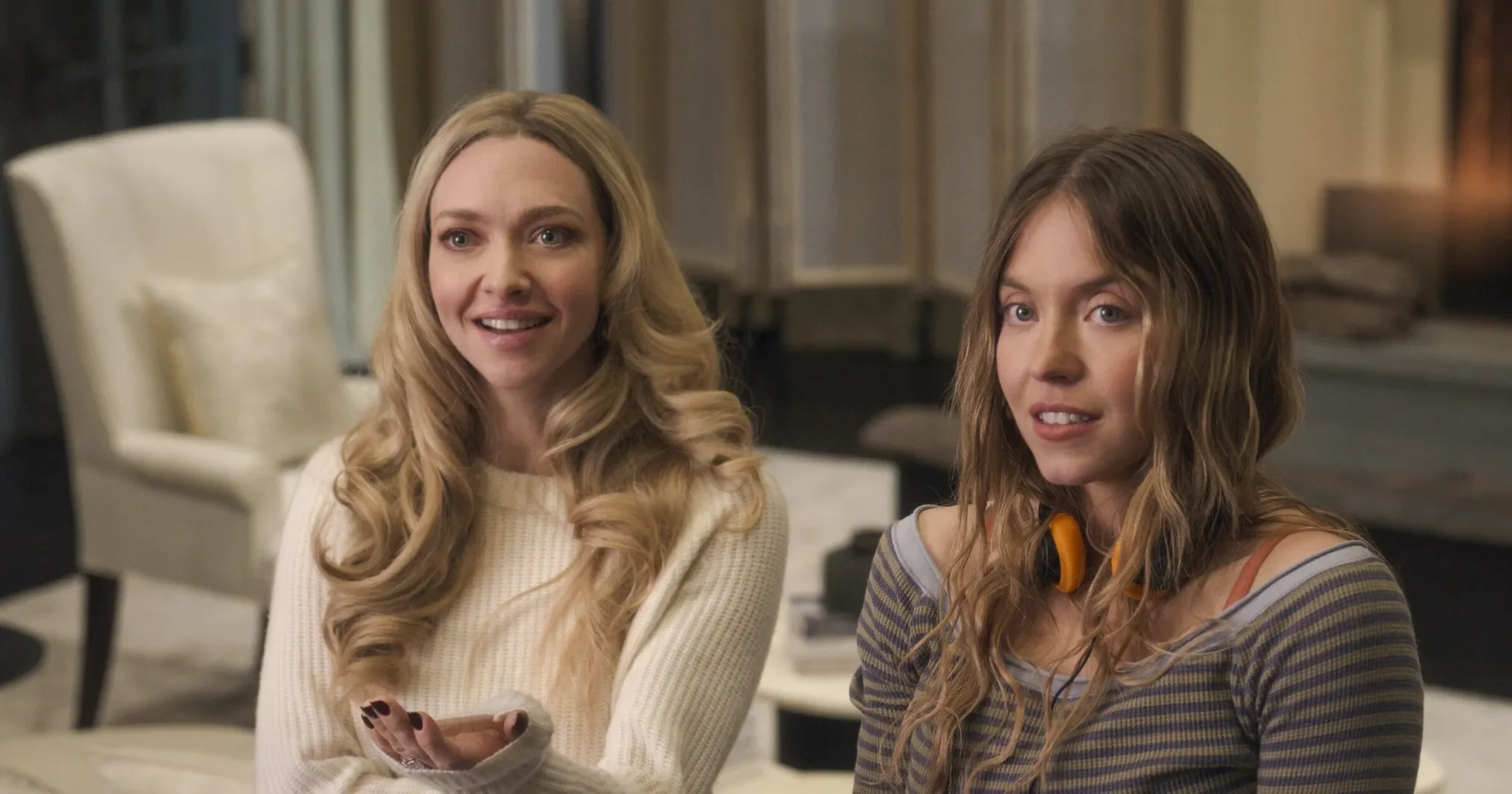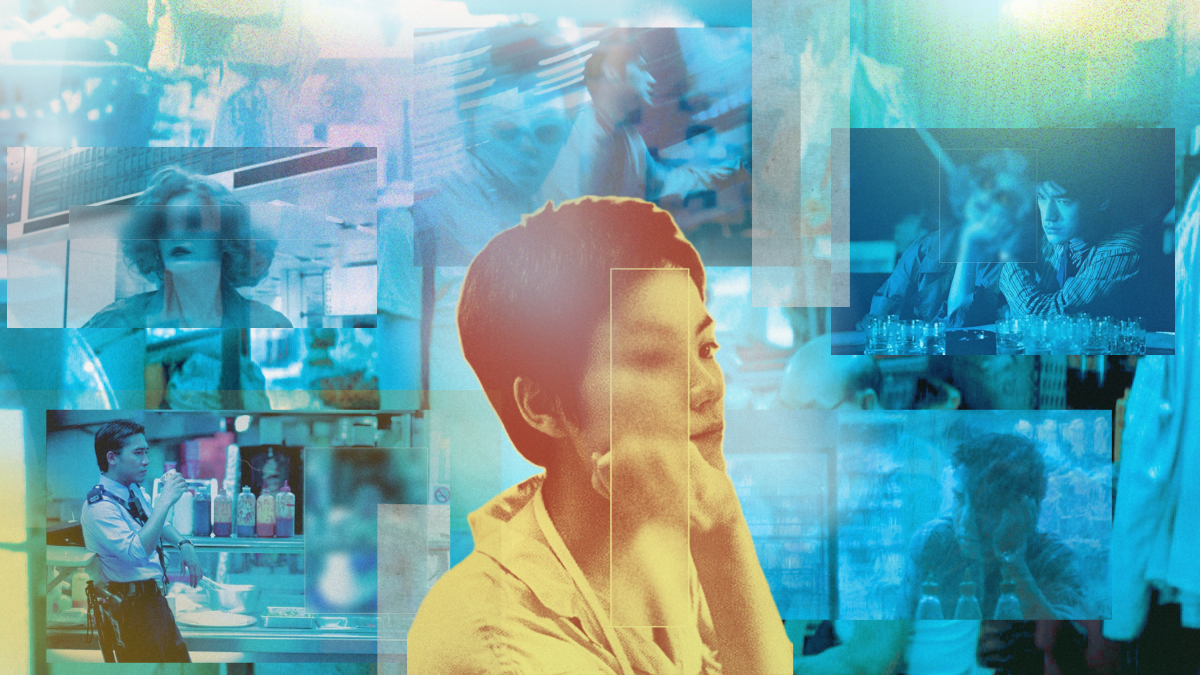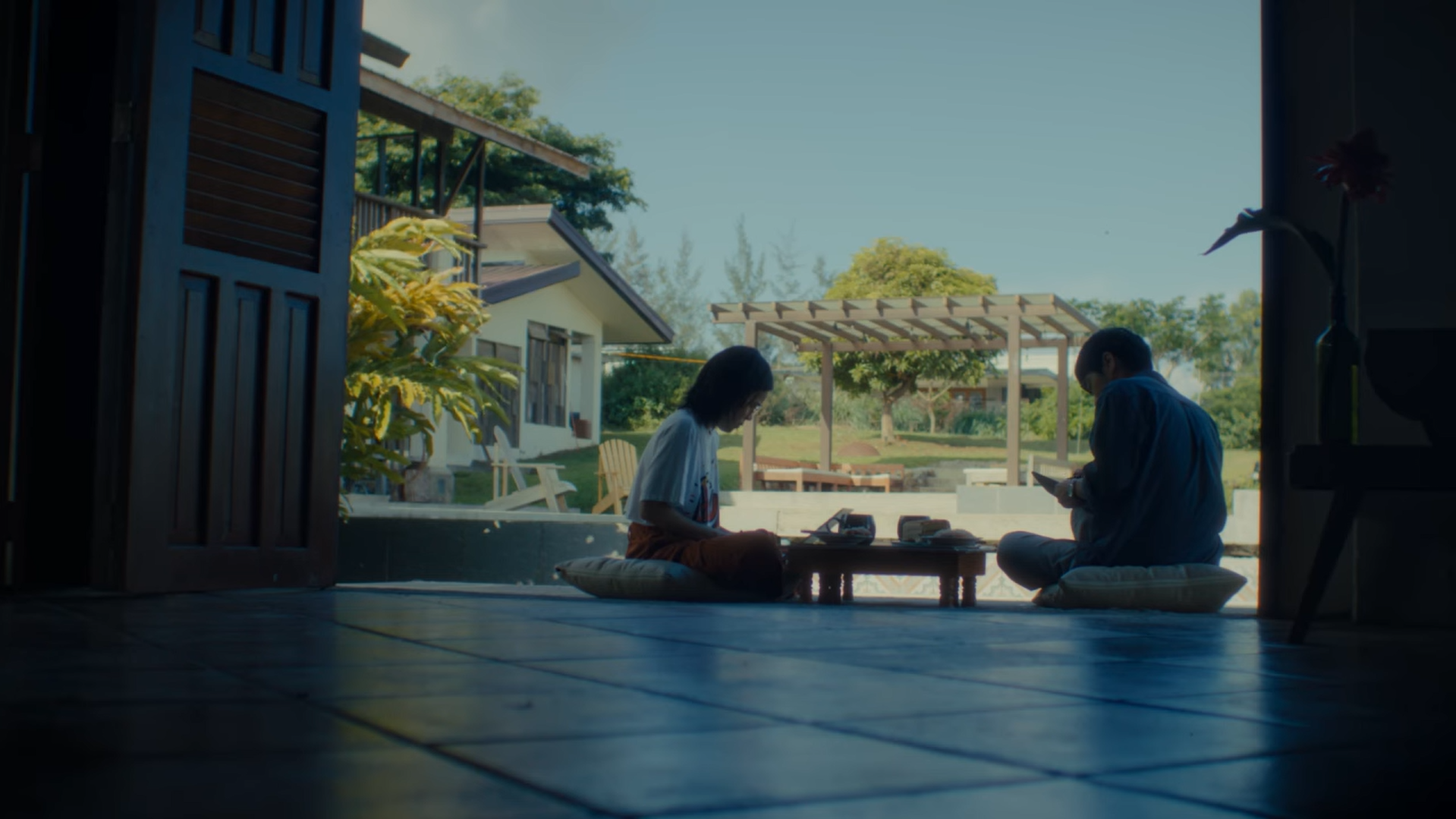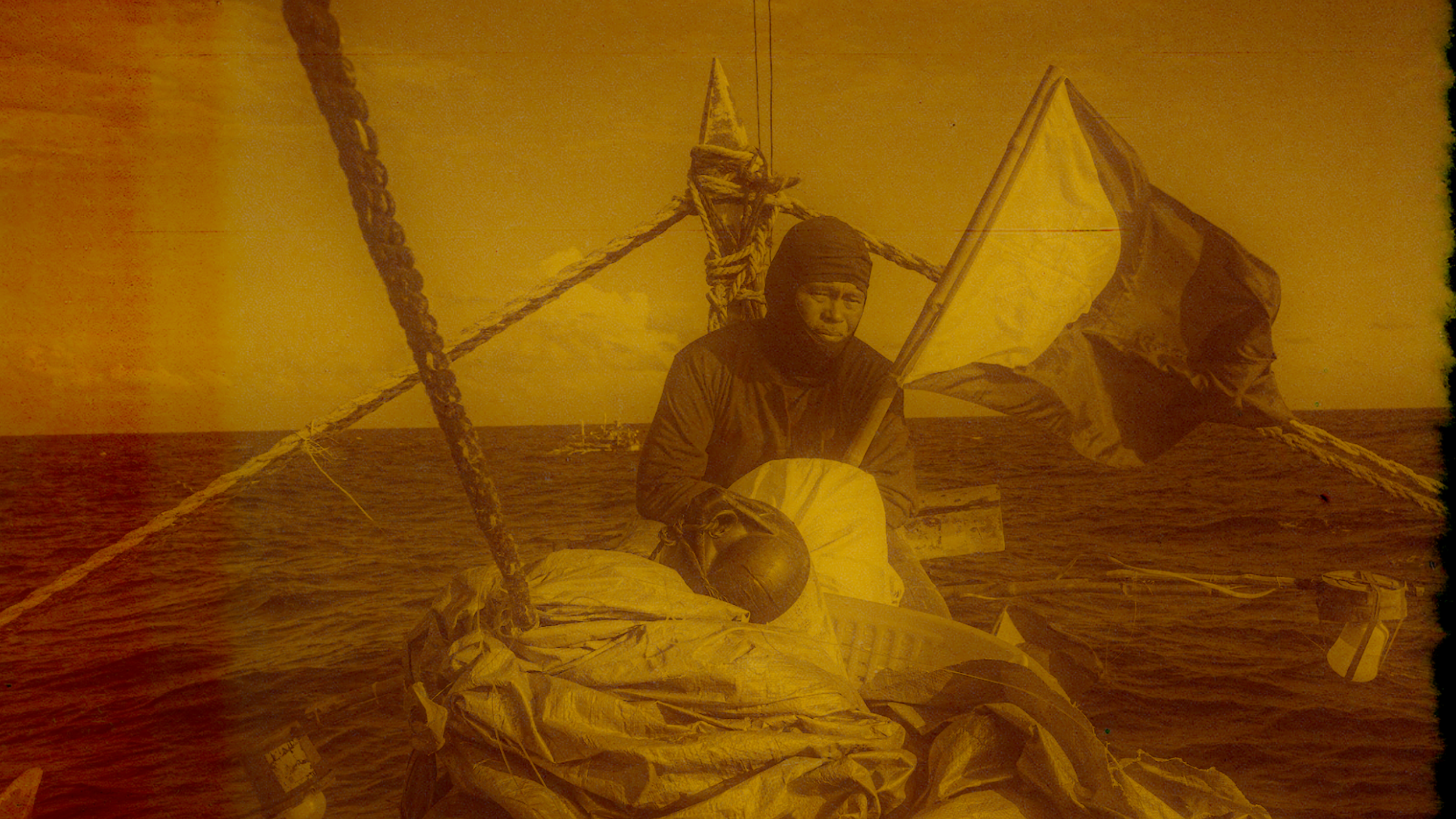‘No Other Choice’ REVIEW: No Other Choice, No Happy Endings
‘No Other Choice’ REVIEW: No Other Choice, No Happy Endings
The Yoo family | Photo courtesy of IMDb
When we first see the patriarch Yoo Man-soo (Lee Byung-hun, in his third collaboration with Park Chan-wook after Joint Security Area and Three… Extremes: Cut), he’s in a state of pure bliss. The sun glows over their immaculate front yard, the barbecue grill sizzles with expensive eel, and his beautiful wife beams as he slips her a pair of elegant dancing shoes. Man-soo takes her hand and leads her to the middle of the yard, their two children watching from the picnic table as the family’s dogs dart playfully across the gravel.
Above them, the sky blooms with soft gradients of blue, orange, and yellow, as if even nature were in quiet agreement with their happiness. It’s the idyllic picture of contentment, a life made possible by Man-soo’s steady job as a paper mill manager at a company he has served for twenty-five years, capped with a group hug so ideal that even Mozart seems to join in, the second movement of Piano Concerto No. 23 in A major, K. 488 swelling as if to affirm this domestic paradise. Man-soo is living the dream, one so perfectly constructed it can only be waiting to crack, or axed, for that matter.
So lost is Man-soo in his own mania that he seems to have forgotten he’s in a Park Chan-wook film. 25 years at the paper company have made him complacent, and when he goes to the American investors to plead for his subordinates’ jobs, he is blindsided by their brisk but cutting response: “I’m sorry, but there’s no other choice.” At that moment, a great mist lifts. The expensive eel and the implied payout were not rewards for a job well done; they were a farewell gift. He is not being rewarded. He is being axed, or, as the Koreans might put it, “off with your head.”
And as the bills begin to pile up, so does Man-soo’s desperation to return to the paper business by any means necessary, even if it means murdering the competition. With that, the stage is set for Park Chan-wook’s jet-black comedy on the cutthroat nature of capitalist ambition that cuts deep into the fragile connection between survival and masculine pride. What unfolds here is less a tale of corporate rivalry than a study of wounded masculinity disguised as ambition.
All of this is seen through Park’s stylistically playful yet razor-precise lens. Like a maestro conducting a symphony of images with the assistance of his longtime editor Kim Sang-bum and cinematographer Kim Woo-hyung, he arranges chaos into perfect harmony. Where most filmmakers rely on straightforward shot-reverse-shots or inserts to convey perspective or connection, Park draws from an entire arsenal of formal techniques — superimpositions, reflections, blocking, camerawork — to build relationships between people, objects, and the spaces they inhabit, all within a single frame.
In one sequence, a character swipes through images of pistols on an iPad, and in that single shot, we see everything: the action, the screen, the movement on it, what she’s looking at, and her reaction to each weapon. It’s a small moment, but one that captures Park’s gleeful devotion to ingenious visual ideas, a kind of cinematic showmanship that astonishes not through excess but through subtlety and precision. Not a second passes without you wondering, “How the hell did he pull that off?”
Man-soo (Lee Byung-hun) and Mi-ri (Son Ye-jin) in No Other Choice | Photo courtesy of IMDb
But the film wouldn’t be as operatic as it wants to be without Park’s longtime collaborator, composer Cho Young-wuk, who once again proves how essential his music is to the director’s vision. I’d even go so far as to say that Park’s films wouldn’t carry the same emotional weight without him. He’s the Boy Back-Up to Park’s Boy Pick-Up. Cho is the composer who gave sympathy and absolution to a woman convinced she deserves neither in Lady Vengeance, who expressed the unspoken longing between Seo-rae and Hae-joon in Decision to Leave, and who made the twisted reveals of Oldboy feel grand, even elegant, despite their brutality. He’s pure magic, and his music here is nothing short of spellbinding as he plays a song to humanity’s bumbling mistakes and its slow demise.
The orchestra feels incomplete, though. Without Park’s longtime co-writer Chung Seo-kyung, the film is more reliant on setups than on the script, which Park co-wrote with Don McKellar, Lee Kyoung-mi, and Lee Ja-hye based on Donald Westlake’s novel The Ax. There is no line here that cuts as deep as “The moment you said you loved me, your love ended. And the moment your love ended, my love began,” or the “Too happy for a sinner” monologue. Nothing that lingers in the chest long after, even with Cho on the assist. The closest the film gets is the line “The bugs are eating it alive,” which neatly ties its themes together, though I’d say that it lands with more force when the film expresses it visually.
Instead, we get something quieter, like Man-soo telling his wife, who seems to know what he’s been up to, to “count up”, not down. It’s a small line, but it captures their opposing states of mind. He looks forward, almost relieved that it’s all over and that he can finally have what he wants, while she faces the future with unease, weighed down by distrust. Still, even without Chung’s instrument, Park’s playfulness remains intact as he sets the stage for the kind of screwball chaos his actors can truly revel in.
And the actors do run wild in this. Lee Byung-hun is reliable as usual, throwing himself into the slapstick romp and buffoonery of his character with total commitment. He’s Larry, Moe, and Curly rolled into one. Lee Sung-min, as Beom-mo, is equally strong, embodying yet another fragile man comically undone by his own pride. The real MVPs, though, are the women. Son Ye-jin, as Man-soo’s wife Mi-ri, and Yeom Hye-ran, as Beom-mo’s wife A-ra, each find distinct ways of coping with their husbands’ stubbornness. A-ra spirals into madness, while Mi-ri clings to the crumbling idea of domestic bliss, holding her family together despite the widening cracks in trust. Both women play their parts to perfection, grounding the absurdity with real feeling.
Man-soo confronts Beom-mo | Photo courtesy of IMDb
Comparisons between No Other Choice and Parasite are inevitable. Both tackle the machinery of capitalism and come from filmmakers who defined a generation of Korean cinema. But for all their surface overlaps, the two couldn’t be more different. If Parasite is a scalpel that cuts deep into class division, No Other Choice is a comically large baseball bat that swings wildly at neoliberal work culture while laughing at the mess it makes. The film’s closest relative, thematically speaking, isn’t a Bong Joon-ho masterpiece but Kiyoshi Kurosawa’s Cloud, which also ties the slow decay of humanity and the anxieties bred by capitalism to wounded masculine pride. Yet where Kurosawa’s humor veers toward senseless nihilism, Park’s feels like a Three Stooges routine filtered through the pitch-black comedy that defined 2000s Korean cinema.
It’s genuinely funny, too. The ludicrous situations Park creates are what make the film so deliriously entertaining, and nowhere is that more apparent than in its centerpiece. A classic Korean rock song blasts from the speakers as Man-soo moves in for his first kill. What should have been a tense moment turns to farce when he’s mistaken for the lover of his victim’s wife, and instead of correcting it, he plays along. The confrontation devolves into a shouting match about pride, their voices drowned out by the music, forcing the audience to follow through captions. Man-soo berates his target to acknowledge his wife's reasonable suggestions regarding his unemployment and stop clinging to the belief that he’s too good for any job outside the paper industry. “Sell your house! Move boxes for a living,” he yells, blind to the irony that he’s guilty of the same pride. Park stages these collisions of ego, humiliation, and desperation with such comic control that you can’t help but laugh at the ridiculous theater of it all.
Beneath the laughter, though, lies something quietly tragic. If you came hoping to chase the emotional high of Decision to Leave, you might walk away disappointed. This is a film that refuses catharsis; its humor curdles into despair the moment you realize there’s no winning here, and even if there were, it would be a pyrrhic one. Man-soo’s descent, funny as it is, comes from the same desperation that fuels every working man convinced they can outlast the machineries of capitalism — a cold, unfeeling machine that replaces them like cogs, obsessed only with profit margins. “The bugs are eating it alive” isn’t just a throwaway line; it’s a prophecy. Automation, layoffs, and the slow replacement of people by machines are part of the same rot that feeds this desperation.
If Cloud was a vision of hell, then No Other Choice is a funeral, where a drunk uncle makes a show of himself and keeps cracking jokes to deny the truth that someone is getting buried. Park fills every frame with manic energy, as if trying to dance around what’s coming. His characters stumble, flail, and talk over one another in their scramble to stay afloat, mistaking all that noise and movement for control. By the time the film reaches its finale, only one truth remains: in capitalism, only a few win, everyone else loses; some just go down oblivious and smiling.



